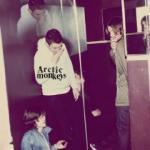
Arctic Monkeys Humbug
(Domino)
Arctic Monkeys front man Alex Turner has an endearingly annoying habit of quietly thinking that he is the smartest bloke in the room. And, really, his saving grace is that he appears to view this as more of a curse than anything else. It’s not that he’s a misanthrope; it’s just that you really bother him.
Through out their relatively short but entirely noteworthy career, the Arctic Monkeys have made a non-art out of ironic indulgences and tongue-in-cheek introspections. Set all this to some dastardly catchy British guitar rock with just a whiff of post-punk/Gang of Four leanings, and the hype will basically work itself. However, the Arctic Monkeys did prove themselves to (more or less) be the real deal with a debut album (Whatever People Say I Am, That’s What I’m Not) that was about twice as good as expected and about half as good as NME would have you believe.
With their follow-up (Favourite Worst Nightmare) a year later, Turner found himself quite young, quite famous, and… surrounded by even more douche bags than before. It’s a mindset that came across easily in the album’s lyrical content, but was also evidenced by the faster (perhaps even angrier), less polished production and composition of the LP. Whether or not the album was destined to be as big a hit as its predecessor, one thing was sure: for better or worse, Turner knew how to push his band in different directions.
Apparently looking to do it again, the Arctic Monkeys latest (Humbug) aims to shake up the band’s foundation while, at the same time, purposefully playing with expectations. Co-produced by Queens of the Stone Age mastermind Josh Homme and veteran British Indie producer James Ford, Humbug easily establishes itself as Arctic Monkeys most menacing album to date. Methodically paced, brooding, and world-weary, it is a bitter, exhausted statement that tends to be far wiser than it has any business being.
Somehow gaining an even more intimate understanding of his role within the group, Humbug finds Turner’s dexterity at both its most inviting and its most steely eyed. The album’s murky atmosphere feeds off of this quality, as it wraps its sound around an intentionally arcane mindset; but a mindset with a relatable cynicism. The end result is an album as moody as the Arctic Monkeys have ever released, and, quite possibly, their boldest.
A fuzzy, swampy production slows down their usual raw/punk edge, but actually adds another dimension that doesn’t necessarily sound more mature--this band would never take themselves quite so seriously--but it certainly comes across as older. Lead single Crying Lightning is one of the better examples of this. About a half a step slower than the band is used to, they make sure to double up on the atmospheric malaise to the track’s great success. Later, third act stunner Pretty Visitors speeds things right up to a familiar pace with its tour de force drum fill clinic and all of its cheeky imagery--not to mention its creepy, sing-along breakdown. Other noteworthy moments are provided by album opener My Propeller, as well as Fire and The Thud, and The Jeweler’s Hands. Unfortunately, though, this is hardly an album without filler. Even slight duds like Potion Approaching, or the heavily metaphorical Secret Door tend to bring the album’s impressive momentum to a halt with their faux-balladry and off-centre aesthetic. In regards to the Arctic Monkeys career, Humbug can realistically end up being either a terrible mistake, or, quite frankly, a revelation.
Standing out as usual, though, Turner is certain to make it known that this is his show; and he doesn’t disappoint. Not as interested in skewering poseurs and sycophants this time around, Turner spends most of the album turning the lens on himself--but not so much in a reflective way as much as personal anguish sort of way. One could speculate there’s been some recent heartbreak there; I’m not up on my gossip, personally. Nevertheless, Turner’s defense mechanisms are as honed and as vicious as his rather formidable bullshit detector has proven to be in albums past, and whatever Humbug lacks in middle fingers, or even thematic continuity, it makes up for with sinister gazes and scathing ambiguities.
22 August, 2009 - 18:01 — Daniel Rivera